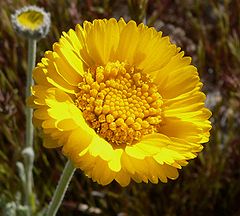Difference between revisions of "Baileya"
(Created page with '{{SPlantbox |familia=Asteraceae |genus=Baileya |habit=herbaceous |lifespan=annual |exposure=sun |sun_ref=Flora - A Gardener's Encyclopedia ISBN 0881925381 |water=dry |water_ref=F…') |
(No difference)
|
Latest revision as of 18:48, 8 April 2011
| Habit | herbaceous
| |
|---|---|---|
| Lifespan: | ⌛ | annual |
| Bloom: | ❀ | early spring, mid spring, late spring, early summer, mid summer |
| Exposure: | ☼ | sun |
|---|---|---|
| Water: | ◍ | dry |
| Features: | ✓ | flowers |
|
Baileya > |
Baileya (the desert marigolds) is a genus of three species in the aster family Asteraceae. All are native to the southwestern United States and to Mexico.
They are typically annual, though B. multiradiata may be perennial. The leaves, which may range from being entire to deeply lobed, mostly occur in a basal cluster. From this arises several flower stems, up to 18 inches (50 cm) in height, usually carrying a single yellow radiate flower each, although B. pauciradiata may have 2-3 flowers on a stem.
Desert marigolds typically have their main bloom in the spring, extending through July. Summer thundershowers may enable a second bloom in October and even into November.
Cultivation
Propagation
seed
Pests and diseases
Baileya species are used as food plants by the larvae of some Lepidoptera species including Schinia miniana (which feeds exclusively on the genus) and Schinia pallicincta (which feeds exclusively on B. pauciradiata).
Varieties
Gallery
References
External links
- w:Baileya. Some of the material on this page may be from Wikipedia, under the Creative Commons license.
- Baileya QR Code (Size 50, 100, 200, 500)

